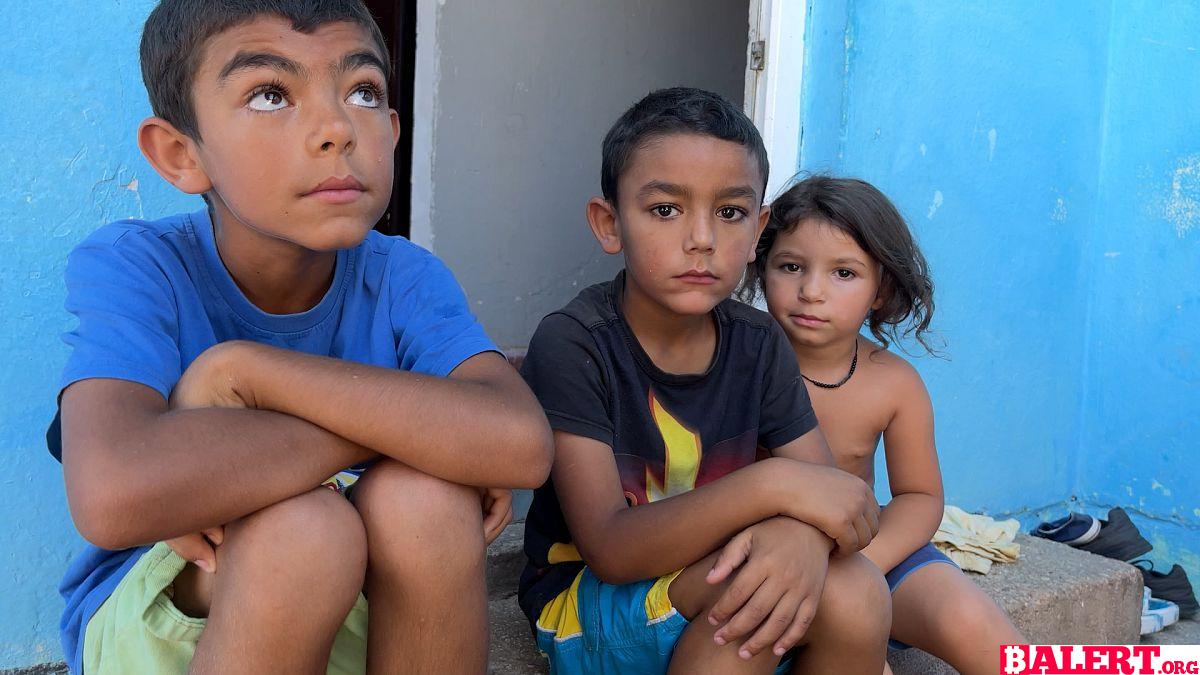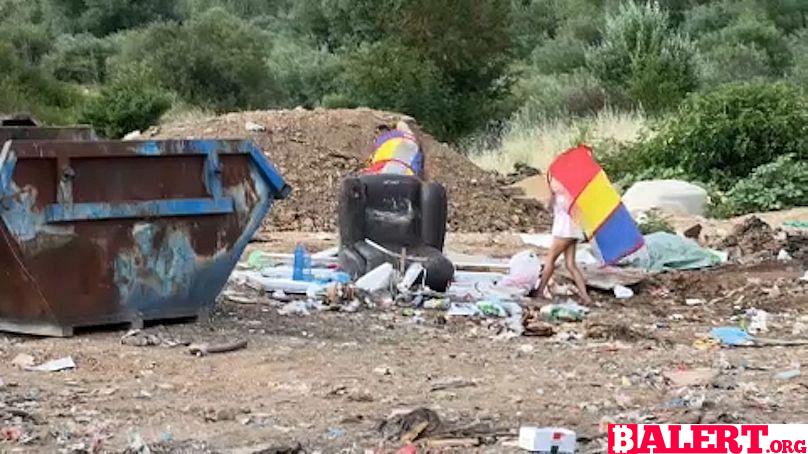World
Observations and Initiatives for Roma Communities in the Balkans
Explore critical observations and innovative initiatives aimed at uplifting Roma communities in the Balkans. Discover insights into their challenges, cultural richness, and the efforts driving positive change in the region.

Observations from a Journey through Roma Communities

During my travels, I encountered a stark contrast in the lives of children playing amidst waste dumps and others preparing for school. I discovered dilapidated shacks alongside modern social housing. I met industrious Roma families as well as individuals struggling with unemployment. I listened to stories of discrimination faced daily and those who coexist peacefully with their neighbors. The picture is complex, but let’s begin with Ramiz Šakoli, a resident of a Roma neighborhood on the outskirts of Nikšić, Montenegro:
“When we go to the city center, people point at us and say: ‘Look, there are the gypsies.’ We enter a coffee shop, and the same remarks follow: ‘There are the gypsies.’ The relations are strained,” he shares. However, change is gradually emerging in some cities.
The European Commission honored seven mayors from the Western Balkans for their initiatives supporting Roma communities. In Montenegro, the award was presented to Marko Kovačević, the mayor of Nikšić, a city with a population of approximately 70,000, including an estimated 1,500 Roma residents.
Change is Happening, but Progress is Slow
Kovačević has actively promoted the construction of 31 social housing units, of which 17 were allocated to Roma families. Yet, when he sought to expand the project, he faced resistance from the local populace: “Change is happening too slowly. The differing lifestyles of the Roma community and the rest of our community in Nikšić contribute to this. Recently, we aimed to build 10 more social housing units, but we encountered significant opposition from the surrounding community,” he explains.
I visited the “Center for Roma Initiatives,” where the NGO advocates for the rights of Roma women. According to the director, Fana Delija, various issues such as health, education, employment, and housing are interconnected. “A crucial first step would be to resolve property rights, a challenge prevalent across all regions of former Yugoslavia,” Delija notes. Some Roma families own their homes, while others do not. A few years ago, the municipality built social housing in the Gracanica district, where around 300 individuals currently reside. However, many residents endure dire living conditions, as Bukurija Sejdi, an elderly resident, describes: “Fourteen people live in this house, including my son with an ill baby. None of us have steady jobs; only one person receives social benefits.” This sentiment is echoed by Roma activist Fana Delija, who emphasizes the importance of focusing on employment in the community over the next four years.
Accompanying Zoja Tarlamišaj, a Roma mediator at the local secondary school, I visited Amela and her six children at home. Amela, married to a Roma man, understands the necessity of solid education for securing qualified employment. Tarlamišaj closely monitors the academic progress of the few Roma children who have reached secondary school. As a Roma herself who successfully completed university—a rarity in Montenegro—Tarlamišaj urges political leaders to reform educational legislation: “If secondary education were mandatory, fewer pupils from the Roma-Egyptian community would drop out after elementary school, allowing them to acquire better qualifications and improve their lives.”
Roma Action Plan in Bosnia-Herzegovina
My journey continues to Bosnia-Herzegovina, specifically to Bijeljina, which has a population of around 100,000, including an estimated 2,000 Roma. The city is actively constructing social housing projects, establishing a shelter for exploited children, and supporting a Roma festival. Mayor Ljubiša Petrović recently unveiled his second Roma action plan, covering the period from 2024 to 2027. “Education is the cornerstone for the greater inclusion of the Roma minority,” he asserts. As part of this initiative, Roma children receive year-round care, thanks to the NGO Otaharin, which provides homework tutoring and psychological support. Every day, meals are offered, along with opportunities for creative activities.

Many families in Bijeljina converse in Romani, which leads to their children entering primary school with limited proficiency in Serbian. This language barrier creates significant challenges, as noted by Sanita Smajić, a Roma coordinator at the Otaharin daycare center, who advocates for intensive language support: “I propose that elementary schools employ assistants for the Romani language.”
The sun blazes down as I meet Vesida and her colleague, harvesting strawberries and packing tomatoes. Vesida enjoys a permanent position on a nearby vegetable farm, Agroplan, while many other Roma opt for day labor, often struggling to secure long-term contracts. Supported by the Austrian Development Agency, Care International, the Roma NGO Otaharin, and the municipality of Bijeljina, the Agroplan vegetable project primarily aims to assist women. “I am very satisfied with my job,” Vesida states. “I understand the hardships of unemployment; there are essential needs and bills to pay.”
Building for a Better Future in Vrnjačka Banja
My final stop is in the spa city of Vrnjačka Banja in Serbia, known for attracting numerous tourists and its tolerant atmosphere. Approximately 400 Roma reside in this area. Over the past eight years, local Roma projects have received about one million euros from international donors, with the city contributing nearly 200,000 euros from its budget. “We have built social housing for families living in the worst conditions and relocated them,” says city mayor Boban Đurović. Since 2016, the city has employed a Roma mediator, Dejan Pavlović. We venture to the nearby village of Gračac, home to around 250 Roma, the largest Roma settlement in the municipality. I meet village representative Živoslav Vujičić, who spent decades working in Germany. Upon returning to Serbia, he constructed a spacious, well-kept house with a neat garden. Today, he serves as the local Roma spokesperson, highlighting the positive relationship with the mayor: “He responds to everyone, not just through social media. People even visit his home for assistance, and he’s always available.”
However, Vujičić acknowledges the challenges faced by the community: “Our greatest need is for a sewage system.” We walk through the settlement, and I meet Vladica, a German-speaking Rom afflicted by diabetes. His brother suffers from a heart condition. They struggle to make ends meet, with Vladica lamenting the inadequacy of their social benefits. He invites me inside their home, which lacks a toilet, forcing them to use an open shack. While the municipality has provided construction materials for renovations, Vladica questions the availability of labor: “We were promised renovations to our bathroom and connection to the electricity network. We have the materials, but we are still waiting for workers.”
New Home, Fresh Start
While many houses in the village are well-maintained, others tell a different story. Roma mediator Dejan Pavlović shows me a dilapidated ruin that once housed a large family. Rain poured through the roof. About a year ago, social services finally intervened, Pavlović shares: “Six people lived in this house, and they were relocated to a new building constructed through a social housing program initiated by the municipality of Vrnjačka Banja. I’m delighted that this family found accommodation.”
Today, seven-year-old Melissa and her family have begun anew. They transitioned from their crumbling home to a brand-new apartment in a social housing estate funded in part by the European Union. Melissa’s father is a tailor, but job opportunities in his field are scarce, so he supplements their income by working on construction sites. To support the family, two grown sons received vocational training with the municipality’s assistance—one became a tiler, while the other trained as a hairdresser. “I finally feel I can breathe again,” says Melissa’s mother, Sonja. “We have enough places to sleep now; we aren’t crammed in like sardines anymore.”
Her teenage daughter, Kristina, is already a mother to a baby named Gabriel. Like many others in Vrnjačka Banja, early pregnancies and school dropouts remain pressing issues. When asked about her future plans, Kristina responds, “Maybe I’ll become a hairdresser.” She shares her excitement about their new home: “Here we have a kitchen and a bathroom where we can take a bath. Before, we had to do it outdoors. It’s wonderful here.”
For genuine change to take place, there must be a concerted political will, sufficient funding, a great deal of patience, and collaborative efforts among NGOs, donors, municipalities, and local Roma communities.
World
Dominique Pelicot Testifies in Harrowing Rape Trial
Join us as Dominique Pelicot courageously testifies in a harrowing rape trial, shedding light on the complexities of trauma and justice. Her powerful story raises crucial questions about the legal system and the importance of support for survivors.

Dominique Pelicot Takes the Stand in Shocking Rape Trial
In a courtroom drama that has captivated France and garnered international attention, Dominique Pelicot, the man at the center of a harrowing rape trial, finally addressed the court. With tears streaming down his face, he recounted how his wife had been instrumental in helping him cope with a tumultuous past marked by trauma. He revealed that he had endured a sexual assault at the tender age of nine while hospitalized, and he also witnessed a gang rape during his teenage years while working as an apprentice electrician on a construction site.
“She didn’t deserve this, I acknowledge that,” Mr. Pelicot stated, his voice barely audible as he struggled to convey his emotions. The gravity of the situation weighed heavily on him, and the courtroom fell silent, straining to catch his every word.
Now 71 years old, Mr. Pelicot faces serious allegations of drugging his wife, Gisèle Pelicot, whom he has been married to for half a century, over a span of nearly ten years. Prosecutors contend that he used drugs to render her comatose, allowing him to rape her repeatedly. Furthermore, authorities allege that he went so far as to invite numerous men into their home, facilitating a nightmarish scenario where they, too, engaged in the assault of his wife.
Overall, 51 men, including Mr. Pelicot, are on trial concurrently, primarily facing charges related to the aggravated rape of Ms. Pelicot. Among them, one individual has already pleaded guilty to similar crimes, admitting to drugging his own wife to assault her and inviting Mr. Pelicot to partake in the horrific act while she was incapacitated.
Mr. Pelicot’s unexpected testimony came after a tumultuous start to the trial. Just a week in, he was stricken with severe health issues that forced him to miss four consecutive days in court. The head judge ultimately decided to postpone proceedings, as Mr. Pelicot was diagnosed with kidney stones, a kidney infection, and prostate complications, adding yet another layer of complexity to this already harrowing case.
World
Meta Bans Russian State Media Outlets from Social Media Platforms
Explore the implications of Meta’s decision to ban Russian state media outlets from its social media platforms. Understand the impact on information dissemination and the ongoing battle against misinformation in the digital landscape.

Meta Imposes Global Ban on Russian State Media Outlets
In a significant move, Meta Platforms, Inc., the parent company of Facebook, has announced the prohibition of Russian state media outlets, including RT (Russia Today) and Rossiya Segodnya, from all its social media platforms. The decision stems from the company’s concerns regarding the deceptive strategies employed by these media organizations to execute covert influence operations across the internet.
Meta made this announcement on Monday, emphasizing that the ban will be enforced worldwide across its various platforms, such as Instagram, WhatsApp, and Threads. The rollout of this ban is expected to take place over the coming days.
Statement from Meta
A spokesperson for Meta elaborated on the decision, stating, “After careful consideration, we have expanded our ongoing enforcement actions against Russian state media outlets. As a result, Rossiya Segodnya, RT, and other affiliated entities are now banned from our applications globally due to their involvement in foreign interference activities.”
For further insights into this development, watch the video in the player above.
World
Trump Recalls Alleged Assassination Attempt While Golfing
Explore Donald Trump’s chilling recollection of an alleged assassination attempt he experienced while enjoying a round of golf. Delve into the tense moments and his reflections on safety, fame, and the unpredictability of public life.

In a recent interview on the social media platform X, Republican presidential nominee Donald Trump recounted a harrowing incident he claims to have experienced while playing golf. Trump described how, during a peaceful Sunday morning round with friends, the tranquility of the day was abruptly shattered by the sound of gunfire in the air.
“It was a beautiful day, everything was just perfect,” Trump reflected. “Then all of a sudden, we heard shots being fired—probably around four or five in total.” He went on to explain that a Secret Service agent was the first to spot the suspect, who was allegedly armed with an AK-47, a powerful assault rifle.
“The agent saw the barrel of the weapon and immediately took action, returning fire at the barrel and aiming in the direction of the bushes,” Trump detailed. “I would have loved to have sunk that last putt, but we decided it was best to leave the scene promptly.”
Trump expressed his gratitude towards the agents and a vigilant civilian who aided in tracking down the suspect, who was eventually apprehended following a high-speed chase.
Suspect Faces Multiple Federal Gun Charges
The FBI has identified the suspect as Ryan Wesley Routh, accusing him of targeting Trump during his time at the golf club in West Palm Beach, Florida. According to an FBI report, Routh had allegedly hidden among the hedges of the golf course for an astonishing 12 hours. Authorities discovered an SKS-style assault rifle, a GoPro camera, and a bag of food at the scene.
The 58-year-old Routh is now facing two serious federal gun charges. If convicted on both counts, he could face a combined maximum sentence of 20 years in prison. Notably, neither of the charges is directly related to an assassination attempt. The first charge pertains to possessing a firearm despite a prior felony conviction, which carries a potential 15-year sentence, a fine of $250,000 (€225,000), and three years of supervised release.
The second charge involves possession of a firearm with an obliterated serial number, which could result in a five-year prison term, the same financial penalties, and also three years of supervised release. As the investigation continues, additional charges could be forthcoming.
While the motive behind Routh’s actions remains unclear, his digital footprint reveals strong political affiliations, particularly concerning issues surrounding Ukraine and China. Routh consistently expressed support for Ukraine across various social media platforms, even claiming to have orchestrated a recruitment scheme for international volunteers aiming to assist Ukraine in its fight against Russia’s invasion. This behavior has been denounced by Ukrainian soldiers and members of the International Legion, who disavowed Routh’s actions and motives.
-

 Business5 months ago
Business5 months agoThe Significance of Jackson Hole: A Central Banking Tradition
-

 Tech4 months ago
Tech4 months agoNew Leaks and Features About the Samsung Galaxy S25 Ultra
-

 Business7 months ago
Business7 months agoObituary: Dan Collins
-

 Article7 months ago
Article7 months agoCreative Design Applications Developed with Artificial Intelligence
-

 Business4 months ago
Business4 months agoBhutan’s Strategic Investment in Bitcoin: A New Era for the Himalayan Kingdom
-

 World4 months ago
World4 months agoThierry Breton Resigns: Impact on European Union Leadership
-

 Gaming4 months ago
Gaming4 months agoNew Details and Trailer Released for Dead Rising Deluxe Remaster
-

 Gaming4 months ago
Gaming4 months agoNew Details for Alan Wake 2 and PlayStation 5 Pro Announcement












